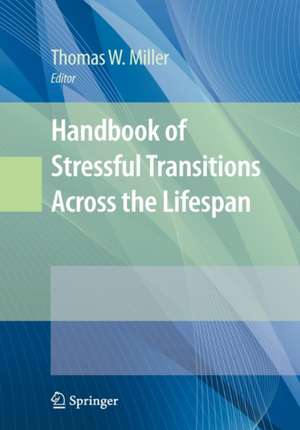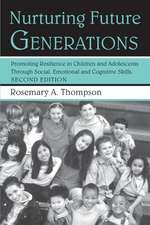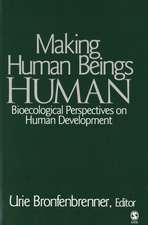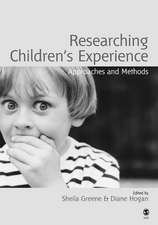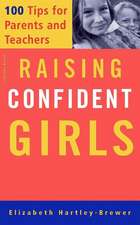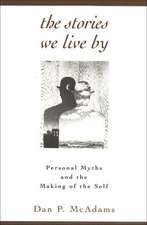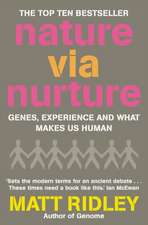Handbook of Stressful Transitions Across the Lifespan
Editat de Thomas W. Milleren Limba Engleză Hardback – 16 dec 2009
| Toate formatele și edițiile | Preț | Express |
|---|---|---|
| Paperback (1) | 2120.19 lei 6-8 săpt. | |
| Springer – 23 aug 2016 | 2120.19 lei 6-8 săpt. | |
| Hardback (1) | 2184.55 lei 6-8 săpt. | |
| Springer – 16 dec 2009 | 2184.55 lei 6-8 săpt. |
Preț: 2184.55 lei
Preț vechi: 2664.08 lei
-18% Nou
Puncte Express: 3277
Preț estimativ în valută:
418.04€ • 431.91$ • 347.75£
418.04€ • 431.91$ • 347.75£
Carte tipărită la comandă
Livrare economică 20 martie-03 aprilie
Preluare comenzi: 021 569.72.76
Specificații
ISBN-13: 9781441907479
ISBN-10: 1441907475
Pagini: 716
Ilustrații: XXIII, 691 p.
Dimensiuni: 178 x 254 x 48 mm
Greutate: 3.19 kg
Ediția:2010
Editura: Springer
Colecția Springer
Locul publicării:New York, NY, United States
ISBN-10: 1441907475
Pagini: 716
Ilustrații: XXIII, 691 p.
Dimensiuni: 178 x 254 x 48 mm
Greutate: 3.19 kg
Ediția:2010
Editura: Springer
Colecția Springer
Locul publicării:New York, NY, United States
Public țintă
ResearchDescriere
This volume provides a unique and valuable contribution to our understanding of the impact of stressful life events and mass trauma on the person, the culture and society in the course of the life span. It provides a comprehensive look at our psychological state of affairs at the beginning of the twenty-first century. There are several volumes that address some or most of these areas indivi- ally but this volume is unique in that it has brought together theoreticians, researchers and clinicians who address critical challenges in our lives. But we are now several months into the global financial crisis requiring a transition, not only for the western world but for the third world. How on earth do families in trauma zones – from Sri Lanka to Afghanistan, New Orleans to Gaza – cope with similar declining older relatives, with added traumas and zero medical resources attempt to survive? In news reports, politicians and financiers denying the inevitable and struggling for solutions that cannot be relevant to the new reality that they have yet to discover.
Cuprins
Processing Transitions in the Life Span.-Life Stress and Transitions in the Life Span.-Eriksonian Theory Applied to Transitions in the Span.-The Effects of Treatment Interventions on the Adult Brain due to Stressful Transitions in the Life Span.-Identity Transitions in the Life Span.-Stress, Mindful Parenting and the Transition to Adulthood.-Transitioning Recent Mass Trauma.-Education and Career Transitions.-The Career Transitions Faced by Adolescents and Young Adults.-The Impact of Trauma History on College Engagement.-Career Transitions Faced by Adolescents and Young Adults.-Life Cycle Transitions.-Ethical and Legal Issues in transitioning the Life Span.-Financial transitions across the life Span.-Assessing, Moderating, and Modifying Implicit Cognitive Processes in Alcohol and Drug Misuse in transitioning adulthood.-Coping with the Workplace and Job-related Transitions.-Trauma Growth After a Traumatic Event.-Family Transitions.-Life Course Transitions: Marriage, Birth and Divorce.-War and Trauma: Transitioning Back into Civilian Life.-Becoming an Adoptive Parent: The Transition to Adoptive Parenthood as a Stressful Life Event.-Transitioning into Retirement as a Stressful Life Event.-Transitions in Health.-The Influence of Contemporary Medicine and Medical Genetics on Stressful Life Transitions.-The Role of Animals and Animal Assisted Therapy in Stressful Life Transitions.-Transition in Health: Coping with Congenital Disease.-Transitioning the diagnosis of Cancer.-Functional Fitness, Life Stress and Transitions in he Life Span.-Transitioning a Traumatic Event: Its Effect on the Adaptation to Family and Self.-Women's Sexuality Across the Adult Lifespan.-Humor as a Way of Transitioning Stressful Life Events.-Stressful Markers of Health: Transitions in Aging.-The Influence of Food on Adapting to Stressful Life Events in the Life-cycle.-Cultural and Spritual Influences in Life's Transitions.-Lifespan Development Revisited: African-Centered Spirituality Throughout the Life Cycle.-Encountering stressful events as well as normative transitions as a test of religious beliefs/coping systems.-Self Regulation across some Life Transitions.-Age-related Patterns in Social Networks Among European Americans and African Americans: Implications for Socio-emotional Selectivity Across the Lifespan.-Some Predicators of Primary Control of Development in Three Transitional.-Periods of the Life Cycle.-Concluding Comments and Future Considerations for Stressful Life Events and Transitions in the Life Span
Recenzii
From the reviews:
"From theory to practice, the Handbook of Stressful Transitions Across the Lifespan takes the reader from the process of recognition to the challenge of helping clients understand and adjust to stress-induced changes in their lives. Its thirty four well-organized chapters exhaustively cover the spectrum of human experience. Each addresses the nature of personal transitions and the distortions that stress introduces to normal development over the lifespan. It is a very helpful book, and it belongs in your collection."
- Steve Schlesinger, Assistant Professor, Department of Psychology, Northwestern University School of Medicine
"The Handbook of Stressful Transitions Across the Lifespan, a multidisciplinary and international volume, is well founded in neurobiological and psycho-social theory elaborating on the stressful transitions occurring throughout life. It is unique in addressing not only life threatening transitions in health and illness, but legal, ethical and financial transitions, as well as those related to education and career. The Handbook further examines the issues surrounding marriage, family, and sexual transitions as well as the cultural, religious and spiritual transitions experienced through life experiences. It is noteworthy that directions for the future are provided to the reader by Handbook’s exploration of the impact of genetic testing, survival of stressful transitions, and examination of post traumatic growth required by humans in order to adapt and accommodate to life successfully. The Handbook provides practical guidance to the reader for meeting these challenging needs of their clients.
- James Holsinger, Professor, Department of Health Services Management, University of Kentucky
The "Handbook of Stressful Transitions Across the Lifespan" is an exceptional multidisciplinary volume, which provides it's readers with an authoritative "one stop" resource for acquiring a comprehensive understanding of the impact of stress across the life cycle. Drawing from a range of international perspectives and scientific disciplines, this collection masterfully succeeds in combining breadth of scope with richness of detail by exploring life transitions through a variety of personal, theoretical, and clinical lenses. Whether working at the bench or the bedside, this handbook will prove invaluable to a wide cross section of professionals working in the fields of medicine, psychology, counseling, and education.
- William P. French MD, Department of Psychiatry, Seattle Children Hospital & University of Washington
"The Handbook of stressful transitions across the lifespan is a substantial tome. The Handbook is directed at both practitioners and researchers. A rich mixture indeed! It builds on the editor’s earlier series of publications on stressful life events (Miller 1989, 1996, 1997, 1998). Overall, it is Erik Erikson’s theory of lifespan development that receives most detailed attention, including Clark’s pschobiographical analysis. Weitzel writes eloquently and unsentimentally about his experience of Parkinson’s disease. Then, three of the five authors of a chapter on the aftermath of unexpected traumatic change recount – in one case with the assistance of another of the authors - their experience of living through serious, sudden and unexpected trauma. Williams’ chapter focuses specifically on what he terms transition psychology, which he uses to consider and indeed predict responses to, amongst other things, mass traumas such as natural disasters and terrorist attacks. You will find chapters that are primarily scholarly discussions and overviews - including Lacković-Grgin and Penezić’s (chapter 22) on self-regulation and Wheeler’s (chapter 26) on African-centered spirituality and its role of in facilitating transition. Elsewhere, there is discussion of more narrowly defined or practically-oriented topics – including nutrition (Ilich and Brownbill, chapter 31), animal and animal-assisted therapy (Adams, chapter 32), the role of humour (Kuhn, Nichols and Belew, chapter 33), and the need for financial planning (Boardmann, chapter 15). In the best tradition of Handbooks, such variety leads readers into new and varied fields of inquiry. I do have a few minor quibbles. I was surprised to see no mention of Erikson’s ‘ninth stage’ (Erikson, 1997), or of the associated theorizing and research on gerotranscendence (for example, Tornstam, 2005). But these criticisms are small beer. Whilst this is not perhaps a book to be read cover-to-cover, it is certainly a book to be consulted, mined and returned to. Miller’s Handbook of stressful transitions across the lifespan is undoubtedly a wide ranging and valuable reference text."
- Dr Léonie Sugarman, Reader in Applied Psychology, University of Cumbria
“For this valuable collection, Miller gathered expert papers addressing key issues in life transitions ranging from college to the workplace and including, for example, refugee displacement and resettlement and the transition to adoptive parenthood--a broad, ambitious scope. … This handbook should interest anyone interested in lifespan studies and the state of research on it. Summing Up: Recommended. All readers.” (P. Flattau, Choice, Vol. 47 (11), July, 2010)
"From theory to practice, the Handbook of Stressful Transitions Across the Lifespan takes the reader from the process of recognition to the challenge of helping clients understand and adjust to stress-induced changes in their lives. Its thirty four well-organized chapters exhaustively cover the spectrum of human experience. Each addresses the nature of personal transitions and the distortions that stress introduces to normal development over the lifespan. It is a very helpful book, and it belongs in your collection."
- Steve Schlesinger, Assistant Professor, Department of Psychology, Northwestern University School of Medicine
"The Handbook of Stressful Transitions Across the Lifespan, a multidisciplinary and international volume, is well founded in neurobiological and psycho-social theory elaborating on the stressful transitions occurring throughout life. It is unique in addressing not only life threatening transitions in health and illness, but legal, ethical and financial transitions, as well as those related to education and career. The Handbook further examines the issues surrounding marriage, family, and sexual transitions as well as the cultural, religious and spiritual transitions experienced through life experiences. It is noteworthy that directions for the future are provided to the reader by Handbook’s exploration of the impact of genetic testing, survival of stressful transitions, and examination of post traumatic growth required by humans in order to adapt and accommodate to life successfully. The Handbook provides practical guidance to the reader for meeting these challenging needs of their clients.
- James Holsinger, Professor, Department of Health Services Management, University of Kentucky
The "Handbook of Stressful Transitions Across the Lifespan" is an exceptional multidisciplinary volume, which provides it's readers with an authoritative "one stop" resource for acquiring a comprehensive understanding of the impact of stress across the life cycle. Drawing from a range of international perspectives and scientific disciplines, this collection masterfully succeeds in combining breadth of scope with richness of detail by exploring life transitions through a variety of personal, theoretical, and clinical lenses. Whether working at the bench or the bedside, this handbook will prove invaluable to a wide cross section of professionals working in the fields of medicine, psychology, counseling, and education.
- William P. French MD, Department of Psychiatry, Seattle Children Hospital & University of Washington
"The Handbook of stressful transitions across the lifespan is a substantial tome. The Handbook is directed at both practitioners and researchers. A rich mixture indeed! It builds on the editor’s earlier series of publications on stressful life events (Miller 1989, 1996, 1997, 1998). Overall, it is Erik Erikson’s theory of lifespan development that receives most detailed attention, including Clark’s pschobiographical analysis. Weitzel writes eloquently and unsentimentally about his experience of Parkinson’s disease. Then, three of the five authors of a chapter on the aftermath of unexpected traumatic change recount – in one case with the assistance of another of the authors - their experience of living through serious, sudden and unexpected trauma. Williams’ chapter focuses specifically on what he terms transition psychology, which he uses to consider and indeed predict responses to, amongst other things, mass traumas such as natural disasters and terrorist attacks. You will find chapters that are primarily scholarly discussions and overviews - including Lacković-Grgin and Penezić’s (chapter 22) on self-regulation and Wheeler’s (chapter 26) on African-centered spirituality and its role of in facilitating transition. Elsewhere, there is discussion of more narrowly defined or practically-oriented topics – including nutrition (Ilich and Brownbill, chapter 31), animal and animal-assisted therapy (Adams, chapter 32), the role of humour (Kuhn, Nichols and Belew, chapter 33), and the need for financial planning (Boardmann, chapter 15). In the best tradition of Handbooks, such variety leads readers into new and varied fields of inquiry. I do have a few minor quibbles. I was surprised to see no mention of Erikson’s ‘ninth stage’ (Erikson, 1997), or of the associated theorizing and research on gerotranscendence (for example, Tornstam, 2005). But these criticisms are small beer. Whilst this is not perhaps a book to be read cover-to-cover, it is certainly a book to be consulted, mined and returned to. Miller’s Handbook of stressful transitions across the lifespan is undoubtedly a wide ranging and valuable reference text."
- Dr Léonie Sugarman, Reader in Applied Psychology, University of Cumbria
“For this valuable collection, Miller gathered expert papers addressing key issues in life transitions ranging from college to the workplace and including, for example, refugee displacement and resettlement and the transition to adoptive parenthood--a broad, ambitious scope. … This handbook should interest anyone interested in lifespan studies and the state of research on it. Summing Up: Recommended. All readers.” (P. Flattau, Choice, Vol. 47 (11), July, 2010)
Notă biografică
Thomas W. Miller is Professor at Department of Psychiatry, College of Medicine, University of Kentucky as well as a senior research scientist with the University of Connecticut’s Center for Health Intervention and Prevention. He is also a University Teaching Fellow and a Diplomate of the American Board of Professional Psychology in clinical psychology. He also is a Fellow of the American Psychological Association, the Association for Psychological Science, and the Royal Society of Medicine.
The author of 10 books, his research has included cross-cultural studies of trauma in veterans; victims of natural disasters; medical conditions, including HIV; and applications of telemedicine in providing access to care for rural and underserved populations.
The author of 10 books, his research has included cross-cultural studies of trauma in veterans; victims of natural disasters; medical conditions, including HIV; and applications of telemedicine in providing access to care for rural and underserved populations.
Textul de pe ultima copertă
The modern life cycle is characterized by stressful transitions, when unexpected events—and even many expected ones—challenge people’s functioning, health, and sense of self-worth. The international, multidisciplinary perspectives provided in the Handbook of Stressful Transitions Across the Lifespan cover these periods as they occur through youth, adulthood, and aging, bringing together theoretical and clinical findings, case studies, and literature reviews in one authoritative volume.
A diverse panel of clinicians, researchers, and educators focuses on the psychological, biological, cultural and spiritual factors surrounding not only trauma and loss but also coping and growth, risk and mitigating factors, and promising interventions. Whether topics are just beginning to receive in-depth attention (the first job; becoming adoptive parents), ongoing issues requiring new insights (veterans’ adjustment to civilian life; chronic illness), or emerging concepts (trauma growth; animal-assisted therapy), coverage is well-written, engaging, and eminently useful.
A sampling of the topics featured in the Handbook:
A diverse panel of clinicians, researchers, and educators focuses on the psychological, biological, cultural and spiritual factors surrounding not only trauma and loss but also coping and growth, risk and mitigating factors, and promising interventions. Whether topics are just beginning to receive in-depth attention (the first job; becoming adoptive parents), ongoing issues requiring new insights (veterans’ adjustment to civilian life; chronic illness), or emerging concepts (trauma growth; animal-assisted therapy), coverage is well-written, engaging, and eminently useful.
A sampling of the topics featured in the Handbook:
- The developmental neurobiology of stress.
- The long-term effects of divorce on children.
- Self-regulation across life transitions.
- Money in (E)motion: stressful financial transitions.
- The influence of food on adapting to life stressors.
- The transition to retirement as a stressful event.
Caracteristici
Covers the entire lifespan
Includes international and multidisciplinary perspectives
Provides a developmental framework for stress studies
Includes ethical and legal issues
Offers theoretical and practical considerations
Includes supplementary material: sn.pub/extras
Includes international and multidisciplinary perspectives
Provides a developmental framework for stress studies
Includes ethical and legal issues
Offers theoretical and practical considerations
Includes supplementary material: sn.pub/extras
